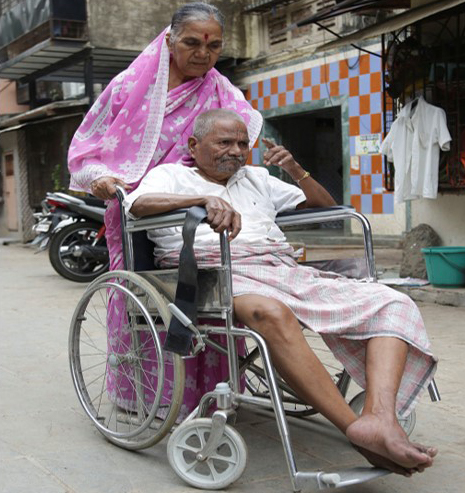- Homepage
- STAGES OF PARKINSON’S

STAGES OF PARKINSON’S
The diagnosis of Parkinson’s disease marks the beginning of a long journey, but the right guidance, knowledge and care will help to make the path simpler to walk. Every person’s experiences with Parkinson’s are unique. Symptoms, and the way the disease unfolds, vary from person to person.
Parkinson’s causes a wide variety of symptoms and effects, which can impact many aspects of daily life. Living well while coping with Parkinson’s involves understanding these impacts and developing strategies to minimize their effects.
This section is a guide to help you live a better, healthier and productive life with Parkinson’s.
Are you newly diagnosed with Parkinson’s?
“You have Parkinson’s.” Hearing these words from your doctor must have started an avalanche of emotions and thoughts in your mind, ranging from disbelief to sadness to disappointment and fear. It might be a moment you will never forget. Being diagnosed with a chronic condition can make you worry, especially with all the information available about potential changes in your body and difficulties with daily activities you may start to experience. A variety of questions would have risen in your mind about how it would be to live with or manage life with a chronic illness. You may have started asking yourself – “WHY ME?”
How can I deal with my diagnosis?
Here are some of the common problems faced by people with Parkinson’s (PwPs) who have been recently diagnosed-
1. You are unsure & afraid of telling your loved ones about your diagnosis, not knowing how they would react. Remember that support from others is a factor that will have a huge positive impact on your journey ahead with Parkinson’s. Sharing your diagnosis with close family members is important and will help you deal better. Here is one way you could tell your loved ones or someone about your illness – “I have Parkinson’s which is a neurological (occurring in the brain) illness which mainly affects my movements (and /or any other symptoms you may have). However, I am taking steps to manage the condition, with the help of medications and exercise prescribed by my doctor. There are a number of therapies and activities available to help fight Parkinson’s”
2. You may experience a range of emotions like denial, anger, fear, sadness, disappointment, etc. You may isolate yourself from your family, friends and loved ones after being diagnosed with this condition. You might feel that there is no one who can understand what you are going through. Such a reaction is normal and very common when a person is diagnosed with a chronic condition. It helps to be honest and share with your loved ones about what you’re going through, what your concerns are and how they can help you. You may seek professional help from a counsellor who will help you cope with the diagnosis. Remember that there are many like you living with Parkinson’s who are going through the same thing you are. A local support group can help you meet other PwPs.
3. You may feel helpless about the condition and worried about what will happen in the future. Consult your neurologist about your medication and treatment options. It is important to remember that there are resources and support available to help you manage Parkinson’s and help you live well moving forward. At PDMDS, we conduct support group sessions where we educate you about the condition and how to deal with it, provide various therapies and also create a space for support and interaction between PwPs and their caregivers. The more information you and others have about Parkinson’s, the more you will be prepared to manage the condition going forward. This will also increase the awareness about
Parkinson’s.
EARLY STAGE PARKINSON’S
During the early stages of Parkinson’s disease, symptoms may be mild, which generally do not interfere with activities. There may be a slight tremor and other movement-related symptoms on one side of the body with slight changes in speech, posture and walking, along with depression, slowness of thought and loss of smell. But the key to living a healthy and fulfilling life is to make a decision right at the beginning to TAKE CONTROL OF YOUR LIFE WITH PARKINSON’S.
The following are a few pointers to help you:
Wellbeing
Acceptance: To accept that you have Parkinson’s is the first and most important step that needs to be taken in order to take control of the condition.
Choose a good doctor: Find a competent doctor with whom you feel comfortable. A Neurologist or a Movement Disorder Specialist will become an important part of your medical journey with Parkinson’s.
Learn about Parkinson’s and understand your condition: Being informed about Parkinson’s – its causes, symptoms, available treatment and management options from the right sources, will help to anticipate and prepare for potential changes in your life. It is important to understand that your symptoms are unique to you and does not mean that you will experience the same symptoms or problems as someone else. Learn to recognize your own symptoms and share any unusual observations with your doctor and healthcare team. Maintaining relationships with family, friends or at work: Having Parkinson’s may lead to a communication gap between your loved ones and you. We need to understand that the diagnosis also affects them and they too may be unsure, angry and scared about the condition as you are. At such times, communicating with them helps to reduce misunderstandings and together, you may find different ways of dealing with the problems you may be facing. Communicate with other people diagnosed with Parkinson’s: This will help to get a better perspective on the condition and its management, and expose you to new techniques on how to deal with your difficulties and problems. Joining a Parkinson’s support centre in your area can help you with this.
Click here to find a support centre near you
Everyday Life
Exercise: Exercise is very important for people with Parkinson’s. As your symptoms are mild, you should focus on more vigorous exercises involving the whole body. Strenuous exercises for strength, posture, balance, flexibility and endurance will help to reduce the progression of the symptoms and keep your heart and lungs healthy. You may include running, cycling, sports and other high energy activities in your routine under the guidance of a trained professional. You must exercise for 30 minutes to an hour every day. It is the quality of exercise that is most important, so make sure you have learnt the correct exercises from a Physiotherapist before beginning them. Apart from physical exercises, exercises to maintain your mental health should also be a part of your daily routine. Solving word puzzles, jig-saw puzzles, Sudoku, crosswords, cognition-based games, playing cards, chess, etc. are very simple ways of keeping your mind active. Also household activities such as maintaining the shopping/grocery list and managing the bank work will help to sharpen attention, memory and calculation skills and thereby exercise your mind functions.
Medications: Medications should be taken regularly and on time. If you experience any unusual changes after taking medicines, share it with your doctor immediately. Do not stop or start taking any medications, or increase or decrease the dosage without consulting your doctor first.
Diet: Making simple, healthy changes to your eating and drinking habits will help to control your symptoms better. Consult a Dietician to help you follow a balanced diet.
Being social: Try continuing to attend outings, social functions, preparing for festivals/religious events, conducting prayer ceremonies, travelling and going on holidays. Engaging yourself in any hobby of your choice- be it cooking, gardening, music, art etc. is very important. Caring for a pet, playing indoor and outdoor games, interacting and spending time with your friends and family should be continued as much as possible. The more physically and mentally active you are, the better control you will have on the condition.
MIDDLE STAGE PARKINSON’S
The progressive nature of Parkinson’s disease may cause the symptoms to increase in severity and affect balance, walking patterns, speech quality and interfere with your daily activities such as eating, dressing, writing and others. Mild to moderate cognitive decline may occur and alter your attention and decision making during everyday tasks. You may experience more frequent memory lapses, trouble multi- tasking and difficulty in organizing, planning and scheduling efficiently. Symptoms of anxiety, hallucinations, fluctuations in on-off periods, fatigue and impulse-control disorders may also be seen. To cope with these changes, your daily routine may require some modifications.
The following are a few pointers to help you:
Well-being
• Regular health check-ups with the doctor: As symptoms may change over time, it is important to visit your doctor every six months to assess any developments that may have occurred in your symptoms. In addition, getting your overall health checked regularly is also important.
• Socializing: At times, with Parkinson’s, socializing may not feel enjoyable due to the changes brought about by the condition. However, just because you have Parkinson’s, does not mean that you must refrain from meeting and interacting with people. Staying connected with others will keep you occupied and active, decrease feelings of loneliness and distract you from the immediate problems related to the condition.
Ask for help: Sometimes symptoms of poor balance and walking difficulties may cause severe instability and lead to falls, or, severe hand tremors may cause eating difficulties. At such times, it is always recommended to ask for help with any activities that are becoming too difficult for you. There is nothing wrong in asking for help. Try to be as independent as possible but ask for help when necessary. Safety should be of utmost importance. A strong and healthy communication with your loved ones and caregivers will help you to find solutions for everyday activities.
Everyday Life
• Exercise: As your symptoms may progress, you should choose exercises that take effort and push you beyond your comfort level. Start slower but make sure you try to build on your strength and endurance gradually. Rigidity, imbalance and slowness of movements may affect your ability to exercise, but you should keep trying. You may have to exercise in modified positions such as chair- based exercises or exercises while holding something sturdy for support to help you maintain stability and balance during your exercise routine. A physiotherapist will guide you with the right kind of exercise plan.Perform exercises that specifically target your symptoms like balance exercises for balance impairments or speech exercises for speech impairments. They should also be task-specific exercises which involve everyday activities you have difficulty doing, such as getting up from a chair or turning in bed. Under professional guidance you may do Yoga, Tai chi or Dance Therapy which engage your full body and mind. Engage in activities such as art and craft, book reading, singing or learning a new language or a musical instrument which will improve your mental health and well- being. A combination of daily physical and cognitive exercise routines will help to keep your mind and body healthy.
Assistance: If walking is becoming very difficult, you may need a walking aid. If you experience choking or swallowing difficulties, you should immediately consult a doctor or a speech therapist. An occupational therapist can help you modify your home as well as certain activities so that you can carry them out with fewer difficulties. If you have trouble talking or you are unable to communicate properly then a speech therapist will help you with strategies and aids to enhance your communication. Assist your caregiver in understanding your difficulties as much as you can. Together as a team you can make each other’s work easier.
Being productive: You may notice that daily activities are requiring more time and effort for completion. This might be a bit frustrating, but make sure you don’t lose hope and keep yourself motivated. Regular practice and staying active will help you to control your symptoms and reduce dependence on others. Continue doing things that make you happy like carrying on with your job, traveling, playing with your
children/grandchildren, communicating with your friends and family over the phone and helping in household responsibilities like folding the laundry, grocery shopping etc. Staying physically and mentally active will help to slow down symptom progression.
ADVANCED STAGE PARKINSON’S
Not everyone reaches the advanced stage in Parkinson’s disease. Sometimes people with Parkinson’s (PwPs) can remain at one stage for years. However some PwPs symptoms may progress and there may come a time when the symptoms become more profound and severe, and the medication may not be as effective in controlling the symptoms as before. Certain symptoms like poor balance, difficulty walking and fear of falling may prevent you from being able to leave your house or your bed without assistance. Major cognitive decline in the form of personality changes and dementia may occur. Assistance may be needed to continue routine activities like dressing, eating, bathing etc. At such times frustration and impatience may build up for you and your caregivers, but it is important to remain calm to be able to focus on what you can do and keep trying. Help and support is available.
The following are a few pointers to help you:
Well-being
Being active: Try to stay as active as you can to prevent stiffness from setting in. Continue to do even the smallest of the daily activities that you can even if it takes a very long time. There are specific exercises and activities you can do while sitting in a chair or at your bed. An occupational therapist can help you modify your objects of daily use such as spoons, toothbrush, hairbrush etc. as well as certain daily activities so that you can carry them out with more ease.
Everyday life
Assistance: As Parkinson’s progresses, swallowing difficulties may occur such as choking when eating or drinking. Consult a doctor immediately if this is happening. A speech and swallowing expert will help you with techniques to aid swallowing. A nutritionist will assist you with modifications in food textures, consistency, timing and scheduling of food/fluid intake to prevent swallowing difficulties. This will also help with any bladder and bowel impairments such as constipation or increased urinary frequency that may develop. If you are experiencing mood swings, personality changes or severe cognitive decline, seeking help from a mental health professional such as a Neuro psychologist or Clinical Psychologist will help you manage the changes better. If standing and walking is becoming very difficult even with assistance and accompanied with a number of falls due to imbalance, then you have to start being extremely careful. A fall can lead to bone fractures and further deteriorate your health condition. Use a walking or mobility aid such as a walker or a wheelchair under the guidance of a Physiotherapist and make sure assistance and supervision is present during all mobility tasks.
Exercise: Increasing rigidity and slowness of movements may affect your ability to exercise, but try as much as you can. A physiotherapist will guide you with the right kind of exercise plan. You may have to do chair- based exercises or bed exercises to keep your muscles strong and reduce stiffness. A daily exercise routine will help to keep the secondary complications of inactivity such as bedsores or chest problems away. To continue exercising your memory, activities such as looking through old photo albums with family and friends, telling ‘remember when..’ stories, re-reading old letters and cards or listening to favourite old songs and watching old movies will help to stimulate cognition in a meaningful way. A combination of simple daily physical and mental exercises with assistance will help to maintain mind and body health.









